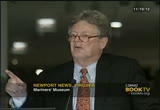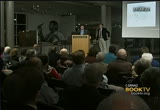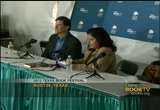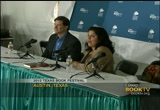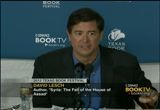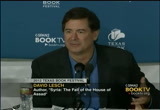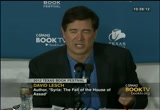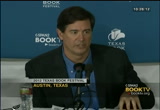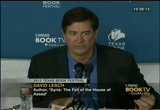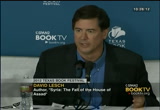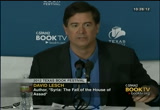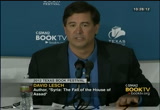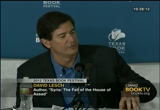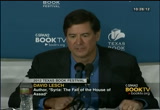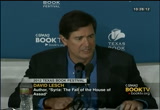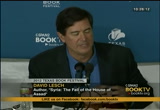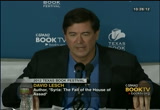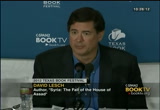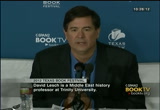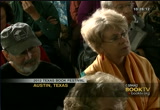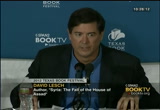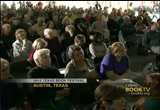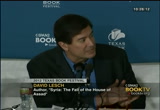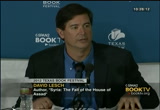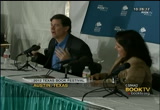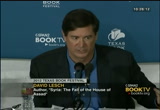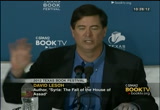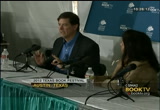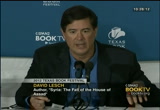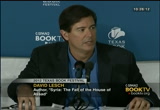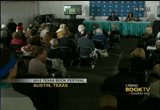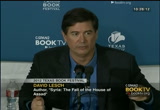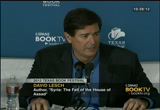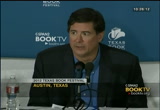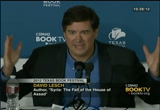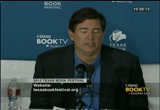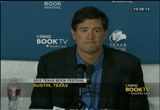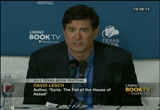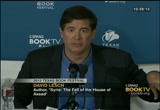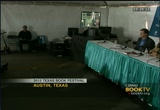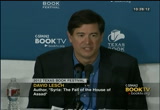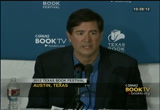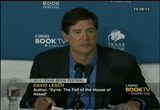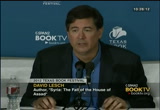tv Book TV CSPAN December 24, 2012 4:15pm-5:00pm EST
4:15 pm
in not understanding what he was saying, a different point was made that we were mepped people. this is our language. we will speak in our language. this is our story. that's what sinke did at every one of the meetings. he told his story in mendi so it's a fascinating thing to see how this matter of the kind of christian identity and the african identity are linked. [applause] >> thank you very much for coming out tonight. just like to invite you back for a reception here, and we'll be back to answer further questions or sign books. thank you very much again. for more information, visit the author's website,
4:16 pm
4:17 pm
>> thank you so much foruch for spending part of your afternoony with us here.s i would like to welcome you alle on behalf of the professor and myself. this is afessor l wesonderful s. i'm saying that dispassionately, and we're so happy you're here.r i wanted to introduce the profe professor to you. he is asch to professor of middt history at trinity university it san antonio. professor lesch is a prolific writer writer and thinker about the the middle east and what's happening in the region. it's really a treat tosy a havem here today.he h w he's written his new book n b "syria: the fall of the house ou assad" which i'm hoping you'll m all purchase and get him toill sign. he signed my copy first so he f. has met extensively with met president assad and officials lg between 2004-2011, been in the middle east, studying the middle st east, making connections andeast friendships in the middle east
4:18 pm
for a quar ater century. the r why that's important is, of course, he knows of what he knoo speaks. spe there's so many people who woule like to write about a region without understanding thet under players, and lucky for us that the professor knows quite a bith about what is happening in syrih and can answer some of the verym akportant issues that are takint inace today. in fact, this past month lingsba there's been a lot of activity is go there he'll touch on. i'm the host of idea lounge on co-op radio, and we both would like to thank the book festival in texas for inviting us to be here.adio professor, welcome. >> thank you. [applause] festival for inviting to us be here. [applause] >> thank you. >> just as pint of housekeeping, we're going to be conversing for a half an hour, and then we'd like to invite you to join the discussion because we are live on tv, the microphone is placed over there in the center of the tent, and way'll have 15 minutes
4:19 pm
for q & a. i know there are a lot more questions than that, and i would like to invite you to go with professor lesch when he does the book-signing and ask more questions there. also, if you could be kind enough to turn off any kind of mobile devices at this point. we would be grateful so the interview is not interrupted. so, professor lesch, can you tell us a little bit about what is happening in syria and how did we get here? >> there's a simple question to start out with. i might take the whole 45 minutes. essentially -- what was very interesting is at the beginning of the uprising in syria in march 2011, many people academics, commentators and particularly most importantly, president assad and his entourage and his inner circle, thought that syria might weather the arab storm that had hit egypt and tunisia, yemen, bahrain and libya.
4:20 pm
he gave an interview in january to a good friends of mine, jay sol low moan, with "the wall street journal" where he said syria was immune from the arab spring. some of the mouthpieces for the regime in february and march were publishing articles in syrian forums that were supportive of the protesters in egypt and tunisia, and there was a contrast made that they authoritarian leaders who were lackeys of the united states and israel, were out of touch with the youth ask the populations in their countries, whereas the president of syria was a young 45 at the time. he was a computer nerd. he liked the technological toys of the west. he was in touch with the syrian population. he certainly was not a lackey of the united states, and israel. in fact he was supported of hezbollah, amass, iran, and
4:21 pm
other groups and states, that had a lot of street credibility in the arab world. so they thought it would pass them over. in fact i know that president bashar had mentioned -- commissioned three studies in february and march before the uprising broke out, and all three said, no, it's not going to happen in syria. so he felt pretty confident. i know for -- i can guarantee you that he was absolutely shocked when the uprising really started to seep into syria, particularly, of course, what lit the fire was the arrest and roughing up of the 15 school age children, teenagers, in the southern city of duras in syria. that touched a nerve. that sort of thing happened in syria quite a bit over the years, but in the new circumstances of the arab spring, and the regime didn't under the new circumstances -- it just grew and grew and grew
4:22 pm
after that. and it unleashed -- i think this pentup frustration, especially among an empowered and energized and largely disenfranchised youth, especially with the help of the new social instrument of the social media, and the regime was totally caught offguard. they didn't realize that syria had been suffering from many of the same socioeconomic and political problems as many of these other countries. the growth rates, one of the highest in the world. the 60% of the population under the age of 25. general unemployment at 25% countrywide, who is a low figure. and higher, over 50-60% among males and females age 25 and younger. and you look at any country in the arab world experiencing the arab spring and these are similar numbers to what i just described. so, there were many of the same socioeconomic factors, the political repreparation, and all of this cop nuisance of things
4:23 pm
that came into the perfect storm of economic crisis of 2008 which made commodity prices higher and depressed economies even more. even such things as the wikileaks, and the the lifestyle while the rest of the population is suffering, and the syrian regime didn't understand the new circumstances and reacted in the way that the outside, both father and son, react when there's a mess. they clamp down on it. a convulsive push button response that isn't given a heck of a lot of response in terms of what to do. everyone was saying, let's implement large-scale significant political reforms along a pluralist model, that was not given too much consideration in the beginning. >> so you had very high hopes for the young leader, and actually he and his wife formed
4:24 pm
this alliance and the profile they showed to the west was modernist, pro west, ready for change. you had a lot of hope and that changed. where did that hope come from and how did it change? >> i wrote a book in 2005, published by the same praise, called the new lion of dam do -- damascus, and i thought this might be a new leader that would change the system. he was different. didn't have the typical profile of a middle east dictator, he was a lioned ophthalmology gist and was a computer nerd. one of the first times -- the first time i met with him in 2004, after the pleasant tries and so forthand i said to him, mr. president, one of the biggest mistakes you made when you came to power in 2000 upon the death of his father was that
4:25 pm
you letted by known you like phil collins music. the english rock star, and he looked at me and he said, this is a guy we're giving access to -- asking me these stupid questions? but i explained, because this contributed to an emerging profile in the west that you were this modernizing, pro western reformer that would engage in direct peace talks with israel, would improve the relationship with the united states. what i said at the time was that i think this created too high expectations in him. and even though such as myself who had measured expectations, they turned out to be too high in the end. and what happened, of course, is that he is a child of the super power cold war, a child of the arab-israeli conflict. the child of the tumult in lebanon that he lived through when he became politically aware, and i also a child ofle
4:26 pm
al-as sad. those changed his world view more so than spending 18 months in london getting an advanced degree in ophthalmology or the fact he liked western music, and ultimately in my view -- which is really the story of this book in many ways -- is, again, many of us hoped he would change the authoritarian system. i think in the enwhat happened is the system changed him. and this is unfortunately, even among the most well-intentioned authoritarian leaders because they raileesed to survive in that environment you have to succumb to that environment. you have to assimilate into that environment. so, the system in syria is very inert in that sense and was much more difficult to overcome, obviously, and perhaps he didn't have the -- where with annual and ability to take on the real
4:27 pm
forces in syria who are status quo forces and against any change that might undermine the foundation of their rule and situation. >> the situp in syria by the colonial powers was france was working with a shiite sect, which is a minority, who were to look after the sunnies, who are the majority. 10% or shias of another sect. assad belongs to this sect ands the military is from this sect and the elite are from this sect. correct? >> partial limit he would not be able to rule if it was only them in the inner circle. >> they basically in control. >> they're dominant in the military apparatus but they have also done a very good job, started under his father. of coe opting many sunnies, christians in particular and others, into the apparatus. >> and the sunni elite, of course.
4:28 pm
they're trying to maintain power. they're a minority group, against this widening majority who is now getting influence from the outside. please set it up, what are the influences from the outside who are taking sides and how is that affecting? it seems like they're at an impasse. the killingings continue and the massacres are increasing. almost 700,000 refugees in three countries that surround them by january or so. at least that's the projection. people are fleeing but there's a lot more going on right now. >> another easy question. thank you. >> this is -- syria is a very, very sad story. it tugs at my heart because i spent a lot of times there. i have friends on both sides of the conflict who have been killed. i have friends on both sides of the conflict whose lives have been disrupted and displaced
4:29 pm
forever. maybe who supreme e people in this program who also had family or friends experiencing this. i was in new york yesterday, and a friend of mine -- with a friend of men, expat syrian, and one of his family members was just kidnapped. they don't know by. who the opposition, the government, or by these subgroups looking to make money in terms of ransoming off people back to the family. that's one whole aspect in any sort of civil war type situation, which it really is right now. you have the criminalization of society in many ways from people who are trying to make a living possible, and then you have groups that become invested in the civil war and the continuing of the civil war you saw something similar in lebanon. i wrote a piece recently in monitor called the lebanonizeation of syria, and unfarmly, of the many scenarios that could occur, in syria,
4:30 pm
because it does seem to be -- there's no easy answer. there is absolutely no easy answer to this. american intervention is not the answer. and i would be happy to talk more about that perhaps in the q & a session. what happened in -- what will happen probably in syria, unless the equation on one side or the ice dramatically changed. you have this balance of forces almost where neither side has the wherewithal to land the knockout punch and both sides think they can win and it's very difficult to intervene with any sort of negotiated solution with both sides think they can win. and when this happens in such a geostrategic area and continues on, as happened in lebanon you have countries on the outside who have interests in syria, as they did in lebanon, who establish ties and alliances with different factions because
4:31 pm
syria is a sectarian countries. there are many different fault lines in syria, many different opportunities for groups looking to advance vis-a-vis other groups to become more receptive to outside intervention of iran, turkey, saudi arab ya and the united states and russia and the european countries. what happened in lebanon -- if left to themselves, lebanon -- which is another sad story -- they might have been able to compromise and come together as they did on a number of occasion before re '7s and '80s, and work things out somehow. find some sort of system and muddle through this. but as they say in real estate, location is everything. and lebanon being between syria and israel, and of course syria itself being on the border of israel, lebanon, iraq, south of turkey, you're not going to be
4:32 pm
-- you cannot be the switzerland over the middle east. are going to have outside influences which usually exacerbate the situation and lengthen the time of the civil war. >> and so let's talk a little bit now, shifting the perspective, to the personal connections that you have to the house of assad. i would love for you to give us a good feel for, who is this man who is the president and how did he change over the time that you've known him? seems like there was a definitive time around 2005-2006 that you say he shifted. please walk us through that. >> again, i first started meeting with president bashar in 2004. i found him to be very welcoming, very unpretentious, self-depricating even, and i never saw him in the mold of a moammar gadhafi or saddam hussein. that's the group he is associated with these days and not a very good group to be associated with.
4:33 pm
and many people who have met all three -- i did not immediate gadhafi or saddam hussein but but assad was different, relatively normal, and he brought people in that gave people hope that maybe this would be different than what had preceded it. his inaugural speech was enlightened. he daneed to criticize his father's policies. so this created much of that hope. and over the years, though, as happens, as is mentioned earlier you get more comfortable with power. the sick coe pants of an authoritarian leader are all over the place. i think outsiders start to believe that what his followers were telling his, the well-being of the countries synonymous with his will being. if something says you're going to save the country every day,
4:34 pm
it's only human nature you're going to believe that and your head gets swelled. when i started to see the changes is after 2005, and particularly in 2007, and that is when he survived what he called the worst the bush administration had against him, had tried against him. because syria was -- opposed the u.s. led invasion of iraq in 2003. the syrian government was looking the other way or even supporting jihaddists who were entering into iraq and killing american and allies forces. so the u.s. and syria were on opposite sides of the street, to say the least. he survived that. he survived the association with the assassination of former lebanese prime minister in february of 2005, in a damning un report that was leaked that held syria responsible. he survived all that and actually emerged in somewhat flying colors by 2008-2009, accepted back into the regional order, into the international
4:35 pm
community, even representatives at an anational plows meeting to jump start the arab-israeli peace talk. so i think he developed a sense of survivalism. he and his supporters. to the point where, when you have another challenge, and the most serious to date, obviously, since march 2011 and continuing today, that sense of triumphantism, that they're on the right side of history, sense of destiny, and i sincerely believe if i talked to him today he would believe that he is not only surviving and protecting the sect and those that supported him in power, but he is saving the country. his match 30th, 2011 speech, his first speech that mapped out what his response to the uprising -- he blamed, he still does, terrorists, storm enemies
4:36 pm
and armed gangs, and many people in the west thought that was a total misdirection, intentional misdirection from the real causes of the uprising. i contend that many in syria and the ruling apparatus actually believe that because that traditionally -- anyone who has spent time in sirra, the political leaders are extremely paranoid and that's borne by real, imperialist match machinations over the world and many that are imagined and many that are used to sanity identify the security state in place. and so this is readily believed. he was speaking in many ways to a converted audience, and so i think all of these things have informed his decision that, unfortunately, to crack down, the brutally suppress the uprising. >> host nemo bark thought he was -- >> there are many differences between the egyptian situation
4:37 pm
and syria. many thought it would not be hit by the uprising. it was but some of the reason about the outline are the reg reasons why the regime is in power, and i think the military security apparatus in syria is much more loyal and aligned with the political apparatus in tunisia and egypt they were more easily separated in egypt it was a military coup against mobarak in syria, it's not the case, they're all in the same boat, sink or swim, and you could not separate that. some of the sanctions and attempts by the united states and the west in the beginning were meant to separate some of the sunni business community, some of the military security apparatus, and it didn't work. and it's probably not going to work you haven't had whole sale defections. there have been some notorious
4:38 pm
defection biz people in the west thought they had power but they didn't. i you really know them and the relationship with the inner circle. and so i think the amount of defections we have seen today are about the only ones you're going to see, and most off of them are sunni muslims rather than christians who tend to obviously support the regime. >> the prime minister was fired and then defected. >> he defected. the prime minister in sirways just a paper pushing post. they really have no influence. it's administrative position. not part of the inner circle. so when that happened, or when falas -- who was a prominent brigadier gené syrian army, and the family was the family most responsible for the assads coming to power, the father and son. the family most associated with the assads coming into power and staying in power. so that was high profile when he deeffected. i know hem well.
4:39 pm
bud had been slowly reduced in power in recent yore. he was not part of the inner circle, and he is and his family are sunni muslims. they felt beholden to separate from the regime, and now they're tying to find a place on the opposition but it's very difficult when you're a talas, who the opposition had been opposing for decade. >> the opposition, prefer lesch, when you tack about it, this is a very fractious group. when you say opposition, who are they? who is the government even talking with, or negotiating with? >> there's no negotiations. a few cosmetic attempts near the beginning with some sanctioned opposition in syria. >> when you say opposition, who is under this umbrella? >> you tell me. it's an an an amalgam of groups with many different faultlines and these faultlines have really undermined the intent over the opposition to present themselves as a viable alternative.
4:40 pm
most syrians today are the silent majority. they haven't taken sides yet. not because they love the assad regime. they don't see any other viable alternative, and in syria stability is incredibly valued and to avoid at almost all cause chaos because there was chaos before the assads came to power. the one thing they did provide was stability. now. that was by force but they provided stability and prosperity for a selected few. so many syrians do not want any instability, will not support anything that produces that. when say see an opposition that's divided amongst themselves, when they see an opposition that has all of these different ideologies and hasn't presented a post-assad vision for the future that is inclusive and they've been terrible at doing this -- they're going to sit in the sidelines and say, maybe assad isn't that bad. i know a number of syrians who were supportive of the opposition in the beginning, but when it turned out that assad
4:41 pm
wasn't going to fall as quickly as ethe gypant president or gadhafi, they were saying maybe assad isn't that bad overall. the stability he can provide. that isn't all of them and there are a number of the opposition committed to the end. this has become an militarized conflict but there are so many faultlines in the opposition, which whys the united states and its allies have been so cautious, and prudently so in my opinion in terms of heightening their sport, especially military aid so the opposition, because whoa who do you support in which group? many of these groups with fight with each other and different outside backers. we have an experience of blindly going into a situation where we don't understand the landscape. afghanistan and supporting the mew -- mujahadeen, and not
4:42 pm
understanding the opposition, the internal opposition and storm -- external opposition, those who are militant and those who hold out hope for negotiated solution, and within each of those categories there are different fault lines. then you have personal antagonisms grown and nurtured by the regime for decades, and then those who are just jockeying to become a foreign minister and are only involved in terms of personal agrandizement and then those who are committed and heroic in and facing death every day and fighting for a vetter -- better society and future. so it's amalgamated and it's hard to pinpoint anyone that will coe a lease these groups. i think that's where we should be working, trying to coe less the opposition.
4:43 pm
>> taking the posture of islam brings in more funding and that's a big problem. even the moderates are shifting towards militant islam because that's where the money is. >> this has been complicating the situation, especially in terms of u.s. support. what is happening in syria, as usually happens in the sort of prolonged civil war, it gets -- you have more radical groups coming to the forewho are willing to take the actions necessary. you have jihadists coming in. that's where is their earn their stripes in a situation like this. some of the groups in syria, the more secular opposition groups, are saying, come on ins, because you're willing to do what's necessary and we're stalemated. you're willing to planned ieds and carry out suicide bombings, and also you need to follow the flow of the money. you follow the money. most of the money supporting the opposition are coming in from private islamist foundations in
4:44 pm
the persian gulf, so there are even some more secular groups in opposition groups in syria who have named themselves -- the tohed group. these are names that resonate. even though they're more secular because they know that's the only way to get money because the usual mechanisms they tried through turkey, council, haven't worked. one dollar out of every hundred dollars that goes through southern turkey gets to actual fighters and $100 out of hundred from the gulf and more islamist private foundations get to the fighters. so how are you going to present yourself in order to fight and get the ammunition and the arms? so there's -- the influence of the jihadists may be exaggerated but it's there. >> let's open this up. this i amazing.
4:45 pm
i could talk to him for a couple hours but let's include you i'd like to ask you a favor. because we only have 15 minutes and i would like to make sure as many of us are ingaged as possible, kindly keep your questions to a salient point, and please speak up, and then professor lesch will answer. so whoever has a question, the microphone is in the middle. yes, sir, please. >> i just am amazed what we hear about syria and i'm pleased to have an expert like yourself, but i did have a question about some of the things that have been proposed like no-fly zones, these type of things. can you answer more about that? >> sure. this surrounds the whole question of more u.s. and western intervention in terms of military intervention. establishing no-fly zones, a safe haven, similar to what happened in libya. the short answer is that libya and syria are apples and
4:46 pm
oranges. sirways a much, much harder nut to crack. syria's defense system was developed to counter israel. that's a sophisticated air force. libways not at all like that -- libya is not at all like that. it's very, very slippery slope. once you want to establish a no-fly zone -- establish a safe haven, you have to establish a no-fly zone and then the safe haven has to protect against are till rare fire? how do you do senate -- do that? a it's a slippery slope. i i was on washington journal a month ago and i was asked this question, and if we go in, or if we militarily either more aggressive support in terms of the military aid or boots on the ground, air toast support, what's hezbollah going to do sunset what's iran going to do? what's russia going to do? this is quite volatile and i
4:47 pm
don't think we have thought out all of the potential possibilities of getting involved in another quagmire in the middle east. and as i said, i have lots of friends there if there was an easy answer to this, if military intervention -- if there was any chance where there was limited damage, collateral damage to our buys -- i use at brook army medical center i used to volunteer in the burn center, the boys coming back from afghan afghanistan and iraq and hit by ied asks other explosions and we have to think of these things before we blindly go in or semi blindly go in, and when i got back home, i received a bunch of e-mails from some generals, colonels, military people, and they were so thankful. they said thank you for bringing that up. thinking of the other side of the equation ask not reactioning
4:48 pm
based on human tear happened to, which is understandable, but we have to think it through. >> thank you for that. and my question has to do with, do you believe that our military policy evolved based on a series of unknowns and that we can't indicate that there's a correlation between taking action and then a result? are we changing enough within the military and the political realms to impact future decisions? >> i hope so. i hope. so because in my view, i think we have seen some incidences in recent history where a lot of that hasn't been thought through. certainly the iraq war, and i was involved in some of that from a bit of a distance, but enough -- close enough to see that we had absolutely no planning whatsoever for the day after. and this is also something to
4:49 pm
think about. if we are somehow more responsible for the taking out of assad and the regime, we are -- it's beholden upon us to help the nation recover. and in a sectarian setting. with outside influences, with regime elements that are protecting their positions in syria. this all sounds very much like iraq. it could be. it could even be worse. so, i like to think that our caution and prudence in this sense over the past year and a half is in part driven by the sense of looking beyond removing the regime. the military will tell you, of course we can remove them. absolutely. it's not hard in terms of all our military might. but it's a lot harder than libya. but what do you do after that? and all of the variables i described come to play.
4:50 pm
and i don't think that the country is in a particular mood to get involved. and this is someone who loves syria, who loves the syrian people, someone who i think -- the syrian people deserve freedom, prosperity and stability no less than anyone else. and i can't wrap my mind around any sort of intervention at this time that will lead to another quagmire and lead to a worse situation for the syrians themselves. >> pick upper last point, talking about the mood of this country and it's affected by reporting and news, quote-unquote news mitchell question is, besides your book, what are the -- you consider closest to first hand or good accounts for people to follow in the u.s.? >> a friend of mine who i greatly respect, rossen, nir, and his last name, rosen, freelance journalist now, most respected in the field.
4:51 pm
he somehow gets along with both sides. i don't know how. but he was imbedded with the opposition and in my view has done the best reporting of the nature of the opposition. the actual level of influence among the opposition and yet he also got to be imbedded with the syrian government troops. so if there's one person i would recommend to read, certainly from a journalist point of view, someone who has been on the ground and seeing this, and who is in my view very objective it would be ner rossen. >> where is he published. >> he is a free lancer right now. he used to be with a number mexicos. do a google with his statement he'll come up. >> need more than just what is in the debates. >> thank you very much. yes? >> good afternoon. my -- actually it's not so much a question as it is a
4:52 pm
proclaimation that there seems to be a lot of peacemakers who have made very deep steps in the peace process at the beginning, and they held out for so very long, it seemed to me, and it really kind of went beyond gandhi's civil disobedience in into akind of melee, and i suppose that those people should -- are they worthy of a claim? or did that in fact happen? >> did -- you mean the opposition or -- >> with people who resisted without being violent. >> oh, yeah. there were a number of protesters in syria. this largely started out as peaceful protests. they were sprinkled with some militant elements but the regime as i mentioned earlier -- in
4:53 pm
syria it's a security state. and i've dealt with these guys. they come after me on the littlest things, and it's a convulsive push button response. so, when i want to place the blame for this thing escalating. peace negotiations can happen anytime soon or a negotiated sellment. i blame the government for escalating so quickly because that's just how convulsively they react to this unrest. they go entire the historical pocket and look at what has worked in the past and what has worked in the past is closer to 1982 hamas. to get at the syrian brotherhood which had been targeting regime elements. they are not free or innocent themselves and 20-30,000 people were killed in a couple of days. now it's been more of a -- what
4:54 pm
i call in the book, machiavellian blood-letting because the regime didn't want this single day or two day or three-day massacre of the city or a chemical -- use of chemical weapon s that would galvanize an international response and compel the international community to respond. so it's been more this piece-by-piece and has to do with the various limitations on the syrian army and the trust tt worthy elements of the syrian army. but i would blame the government most of all for that initial reaction. >> thank you. yes. >> yes, personally don't think we should have gone the middle east in a war for any reason, but bush had to have his war. the russians failed, the british failed. don't you think we started all these clans and these
4:55 pm
factions -- haven't we stirred them up by starting these things we did? can you comment on that? >> comment on how we can -- >> well, not on -- well, you kind of tried to say what we could do, but didn't we serve all this stuff up anyway going into iraq? >> oh, yes, yes. >> the clans, the factions. if the british couldn't do it and the -- what made us think we could do anything? >> you know, it's -- everyone thinks they can do it better. everyone thinks they have the right answer because they have history as a guide, and often times it's proven to be a mistake. that those forces that made it so difficult for the british and the french have also made it difficult for the americans and the russians, and so forth, and i remember during self episodes
4:56 pm
of u.s. direct involvement in the middle east and you read british and french newspapers, the op-ed columns, and many of them are obviously against the u.s., and basically because it's like we've been there and done that and it doesn't work. and because of the complex advertise -- complexities that exist in the regions much of it the design of the middle east following world war 1 and the artificial state that came into being and it's a catch-all but there's a lot of truth to that. >> there is a hope for a coe coalescing opposition voices. >> there's always hope. but i don't think anytime soon. as i said earlier, the faultlines are severe. they're multifaceted. the international community has tried to bring some of these groups together. but there are faultlines within the international community. even the saudis and the -- you
4:57 pm
would think who are on the same page in terms of supporting the groups in syria itself, they've started to have some disagreements on which groups to support. so, to get the opposition on the same page and to develop an opposition group or leadership that represents most syrians -- not all but represents most, that is inclusive, that is committed to the protection of minorities, when the assad regime falls, is very, very difficult. on top of getting all of the international players and regional players together. this is why in some ways -- the long-term hope, perhaps, is a syrian solution for syrians. after this goes on a little while. a stalemate has developed to the point where, as in lebanon, all sides finally came together and
4:58 pm
agreed to restructure the political system and somehow move forward even if tenuously so. >> i thank you for helping out with the situation and helping the libyan people. my question deals with -- okay. i guess it's safe to assume that the international community is calling for assad to step down, and i we can assume he will fall eventually. what is the international community doing to plan for that transition? >> yeah. first of all, the assumption he'll fall some day might be a mistaken one. there's a very real possibility of that. this is a situation that is so volatile and complex. i mean, he could fall personally tomorrow. but at the hands perhaps of some others who think he is thinking
4:59 pm
bat negotiated solution and they don't want to do that. there's a core group that are going to be there for a while, and they still think they can win and they see this in the long-term. if it takes ten years, that's fine. we'll turn this around because the middle east always seemingly affords an opportunity to reengray shade yourself. assad has done that himself. he came in from out of the cold and found a seat at the diplomatic table. so, what might happen, unfortunately, is assad and the government may control certain areas of the country, rebel groups, backed by different outside factions, outside countries, controlling other parts of the country, and what i said earlier about the lebanonizeation of syria. there are plans, organizations that are trying to plan for a post-assad syria should it
127 Views
IN COLLECTIONS
CSPAN2 Television Archive
Television Archive  Television Archive News Search Service
Television Archive News Search Service 
Uploaded by TV Archive on

 Live Music Archive
Live Music Archive Librivox Free Audio
Librivox Free Audio Metropolitan Museum
Metropolitan Museum Cleveland Museum of Art
Cleveland Museum of Art Internet Arcade
Internet Arcade Console Living Room
Console Living Room Books to Borrow
Books to Borrow Open Library
Open Library TV News
TV News Understanding 9/11
Understanding 9/11